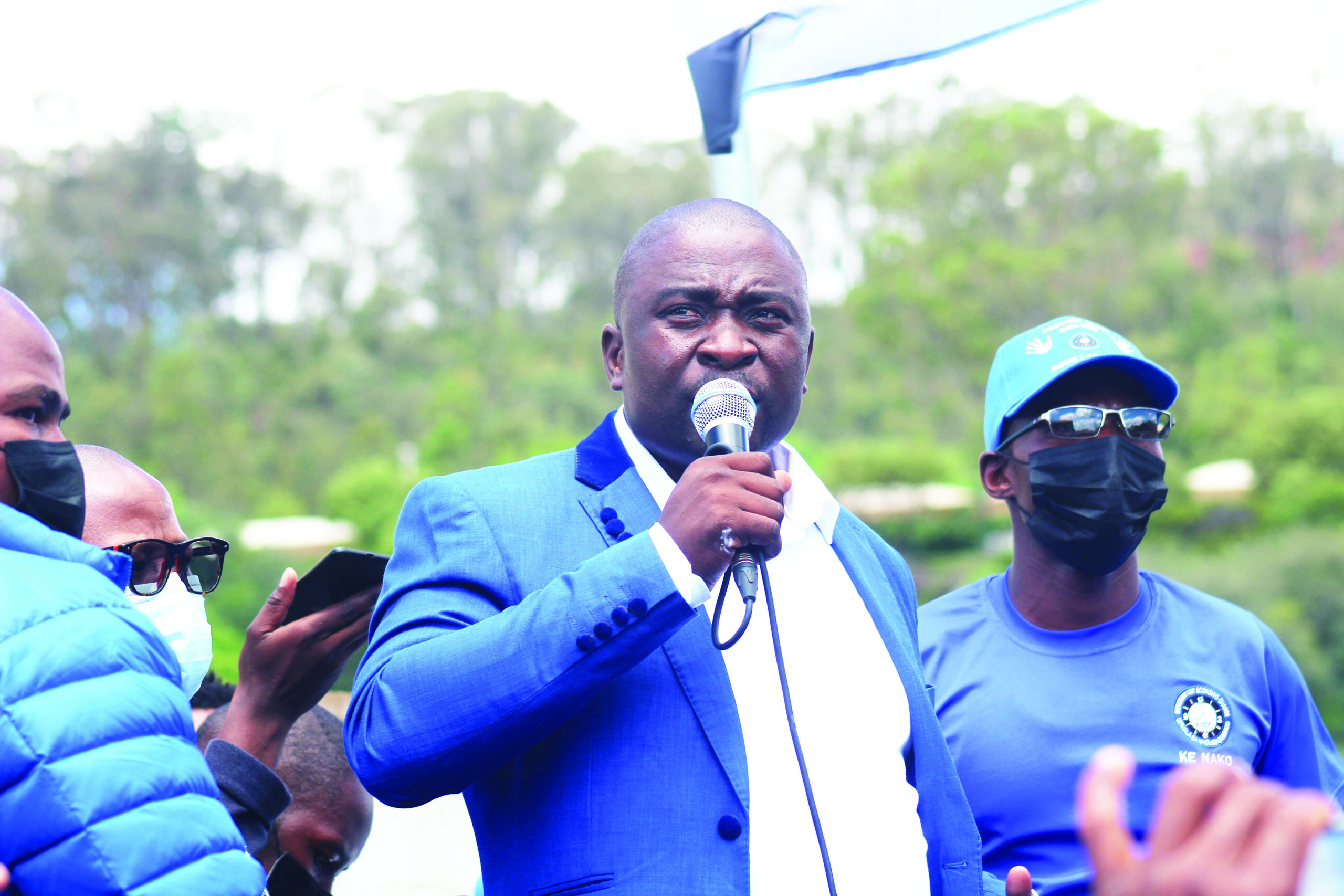Bongiwe Zihlangu | Seithati Mphatšoane
MOVEMENT for Economic Change (MEC) leader, Selibe Mochoboroane, says if elected into power, his government would immediately create a sovereign wealth fund to pay for the construction of infrastructural projects.
Addressing about 1000 party supporters at a campaign rally in Matsieng, Maseru, this week, Mr Mochoboroane said an MEC government would also borrow from much cheaper local sources such as the pension funds to finance the capital projects.
This would ease the country’s huge debt burden which has grown over the years due to the culture of borrowing from foreign nations and multilateral institutions which charge exorbitant interest rates, he said.
Lesotho has perennially failed to fund infrastructural projects to boost economic growth.
Mr Mochoboroane, who is also Development Planning minister in the current governing coalition, said he will change that.
He said Lesotho had failed to register meaningful economic growth over the years because successive governments allocated the bulk of the budget to recurrent instead of capital expenditure.
If this practice continued, whoever won the upcoming elections would find it difficult to finance the development projects they had promised in their campaign manifestos, he said.
“When you compare the recurrent budget to the capital budget, the latter is measly,” Mr Mochoboroane said.
“The huge disparity between the capital and recurrent budget has been consistent from as far back as 2008. There’s no way that Lesotho can develop under such conditions. There’s no way we can realise progress if we don’t invest in our economy by pouring more funds into the capital budget,” the MEC leader said.
He said unlike other parties which had promised massive developments without saying how these would be realised, the MEC had a clear programme to mobilise resources for infrastructural developments upon winning power.
Among other options, he said an MEC government would renegotiate the state’s minority shareholdings in various diamond mining companies to give it controlling stakes.
As the major shareholder, an MEC led government would then be able to realise greater revenue from diamond sales. The revenue would in turn be used to build a sovereign wealth fund to finance capital projects, he said.
“Our diamonds have not benefitted this country in a way that would cause future generations to point at infrastructure that was built from proceeds from their sales. We have no control because the Lesotho government has smaller shares compared to foreign investors operating our diamond mines. We would have to go back to the drawing board and devise how we can buy back more shares to give us controlling stakes.
“We would then be able to use our increased revenues as majority shareholders to build a sovereign or development fund. Alternatively, we could call it the Lesotho Fund. This would then be used to fund infrastructural developments,” Mr Mochoboroane said.
He also said more funds for capital projects could be generated through the review of the Lesotho Highlands Water Project (LHWP) agreement with South Africa to increase Lesotho’s royalties for the transfer of water to the neighbouring country.
“We must benefit more from our water resources. We’ve been supplying water to South Africa for more than two decades, but the royalties have remained the same. The royalties we’re getting must increase. When they increase, we can inject more money into the consolidated fund.”
Mr Mochoboroane said an MEC government would also increase its revenue base by improving collections from non-taxable sources such as payments for services offered by the health, home affairs and traffic departments among others.
“We have observed that of all the collections we make, government departments contribute the lowest to the gross domestic product (GDP). Collections for various services amount to just about M2, 5 billion annually on average. But I believe we can collect as much as M6 billion.
“I know what I am talking about; civil servants in charge of collections are ripping off the government. When people pay for services, they (civil servants) take half for themselves and give the remainder to government. I have seen a report detailing this abuse of state funds while I was chairperson of the parliamentary Public Accounts Committee (PAC). But government, through the law enforcement agencies like the police and Directorate on Corruption and Economic Offences (DCEO), have never shown any interest in prosecuting the offenders,” Mr Mochoboroane said.
He also spoke of the need for government to borrow from local sources such as pension funds. This, he said, could help reduce the huge debt burden which had accrued over the years due to reliance on foreign nations and multilateral institutions such as the International Monetary Fund (IMF) and World Bank.
“Lesotho borrows money from foreign countries whose interest is exorbitant and is charged in foreign currency. However, if we borrowed from local pension funds, the interest rates would be manageable because the debt would be in the local currency. Borrowing from local pension funds would be cheaper than borrowing from the United States of America, China and organisation like the World Bank and IMF,” Mr Mochoboroane said.
While presenting the 2022/23 budget speech earlier this year, Finance minister, Thabo Sophonea, said the government debt stood at M18, 9 billion. He said of that amount, the external debt stood at M15, 5 billion while the domestic debt was M3, 4 billion.

